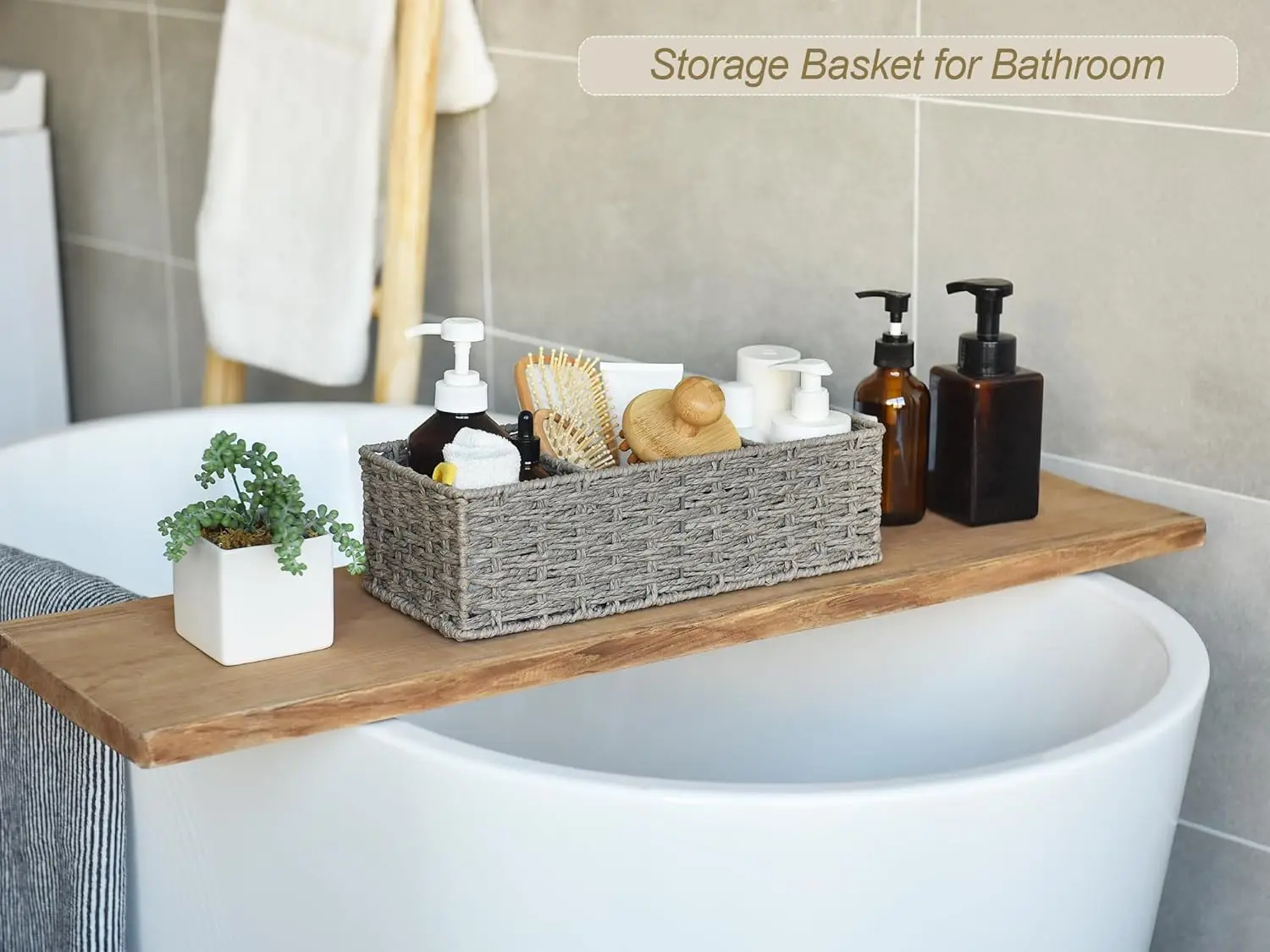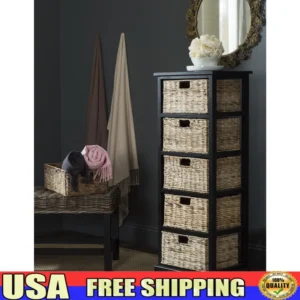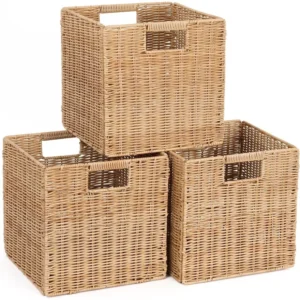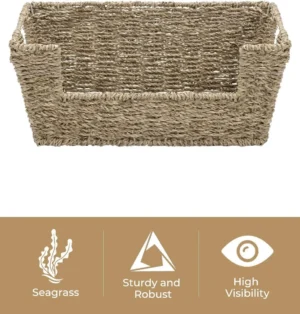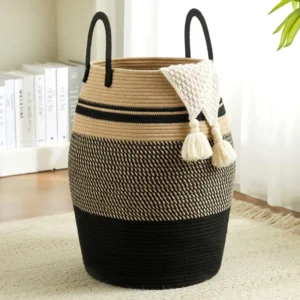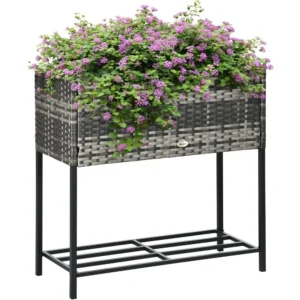Understanding the Impact of Proper Basket Sizing on Wardrobe Organization
Opening your wardrobe to find a jumbled mess of clothes, accessories, and personal items can start your day on a frustrating note. Many of us struggle with disorganized wardrobes that make finding what we need a daily challenge. The good news? Properly sized baskets can completely transform your wardrobe organization system.
When you select the right basket sizes for your wardrobe shelves, you unlock several key benefits:
- Maximized storage space – Every inch of your wardrobe becomes functional, eliminating wasted corners and gaps
- Improved visibility and accessibility – No more digging through piles to find what you need
- Enhanced aesthetics – A visually cohesive wardrobe that brings a sense of calm and order
- Protection for your belongings – Items stay clean, wrinkle-free, and in better condition
Imagine the difference between frantically searching through a chaotic closet versus easily sliding out a perfectly sized basket containing exactly what you’re looking for. The principles behind organizing laundry with wicker baskets apply equally well to wardrobe organization, creating systems that save time and reduce stress.
Throughout this guide, we’ll help you navigate the sometimes confusing world of basket dimensions, materials, and organizational strategies to find the perfect solutions for your specific wardrobe needs.
The Science of Wardrobe Space Optimization with Correctly Sized Baskets
Understanding the relationship between basket dimensions and wardrobe efficiency might not seem exciting at first, but it’s the key to transforming your storage space. When baskets fit properly on your shelves, you create a system that maximizes every cubic inch while maintaining easy access to your belongings.
The most efficient wardrobe organization strikes a delicate balance between maximum storage capacity and practical accessibility. Baskets that are too large create wasted space around the edges or might not fit at all. Conversely, baskets that are too small leave unused space and fail to contain items effectively.
Proper basket sizing helps prevent common wardrobe organization problems:
- Wasted vertical space – When baskets are too short, valuable air space between shelves goes unused
- Damaged items – Overstuffed or ill-fitting baskets can crush, wrinkle, or damage your clothing
- Retrieval difficulties – Deep baskets packed with small items create frustrating “excavation” projects
- Visual clutter – Mismatched basket sizes create a disjointed, messy appearance
A few inches can make a remarkable difference in storage capacity. For example, a basket that’s just 2 inches taller might accommodate an additional stack of t-shirts, while a basket that’s 3 inches deeper could double your storage capacity for lightweight items like scarves or undergarments.
The principles that make wicker laundry basket storage ideas so effective apply equally to wardrobe organization—creating systems that work with your space rather than against it.
Essential Tools and Techniques for Measuring Your Wardrobe Shelves
Before purchasing any storage baskets, taking accurate measurements of your wardrobe shelves is absolutely essential. This simple step prevents the frustration of returning ill-fitting baskets and ensures you maximize your storage space.
Here’s what you’ll need:
* Tape measure
* Notepad or phone to record measurements
* Pencil
* Flashlight (for darker wardrobe corners)
Follow these steps to measure your shelves correctly:
Step 1: Measure the depth
* Measure from the front edge of the shelf to the back wall
* If there are obstructions like hinges or supports, measure to those points as well
* Record the usable depth (the shortest measurement)
Step 2: Measure the width
* Measure from one side of the shelf to the other
* Note any side obstructions that might reduce usable width
* For divided shelves, measure each section separately
Step 3: Measure height clearance
* Measure from the shelf surface to the bottom of the shelf above
* If no shelf above, measure to any overhead obstruction
* Record this as your maximum basket height
Step 4: Note any obstructions
* Check for door frames that might limit access
* Identify shelf supports, hooks, or other elements that reduce space
* Consider how doors open and close in relation to shelves
For context, most wardrobes fall within these common dimensions:
* Standard shelf depths: 12-16 inches (30-40 cm)
* Typical shelf widths: 24-36 inches (60-90 cm)
* Common height clearances: 10-15 inches (25-38 cm)
With your measurements in hand, you’re ready to explore rattan shelf baskets and other options that will perfectly fit your space.
Calculating the Perfect Basket Dimensions for Your Shelves
Now that you have your wardrobe measurements, it’s time to determine the ideal basket dimensions. A critical principle to remember is the “breathing room” concept—baskets shouldn’t be an exact fit to your shelf dimensions, as this creates practical problems with insertion, removal, and cleaning.
Recommended Clearance Guidelines
For optimal functionality, follow these clearance recommendations:
- Width clearance: Leave 0.5-1 inch (1-2.5 cm) on each side of the basket
- Depth clearance: Keep 0.5-1 inch (1-2.5 cm) from the front edge of the shelf
- Height clearance: Maintain 1-2 inches (2.5-5 cm) between the top of the basket and the shelf above
Calculating Your Ideal Basket Size
Let’s put this into practice with a calculation example:
For a shelf measuring 14 inches deep × 30 inches wide × 12 inches height clearance:
- Ideal basket depth = Shelf depth – Front clearance = 14” – 1” = 13 inches max
- Ideal basket width = Shelf width – (Side clearance × 2) = 30” – 2” = 28 inches max
* Or for two baskets side-by-side: (30” – 3”) ÷ 2 = 13.5 inches max per basket - Ideal basket height = Height clearance – Top clearance = 12” – 1.5” = 10.5 inches max
When deciding between one large basket or multiple smaller ones, consider:
* Larger baskets provide unified storage for bigger items
* Multiple smaller baskets allow for better categorization and organization
* Smaller baskets make it easier to access specific items without disturbing others
For vertical storage optimization, consider stacking baskets if your shelf height allows. Just ensure the lower basket has sufficient structural integrity to support weight and that stacked baskets don’t exceed your height clearance.
Tidy Treasure offers various wicker shelf baskets that come in dimensions carefully designed to work with standard wardrobe configurations while providing the necessary breathing room.
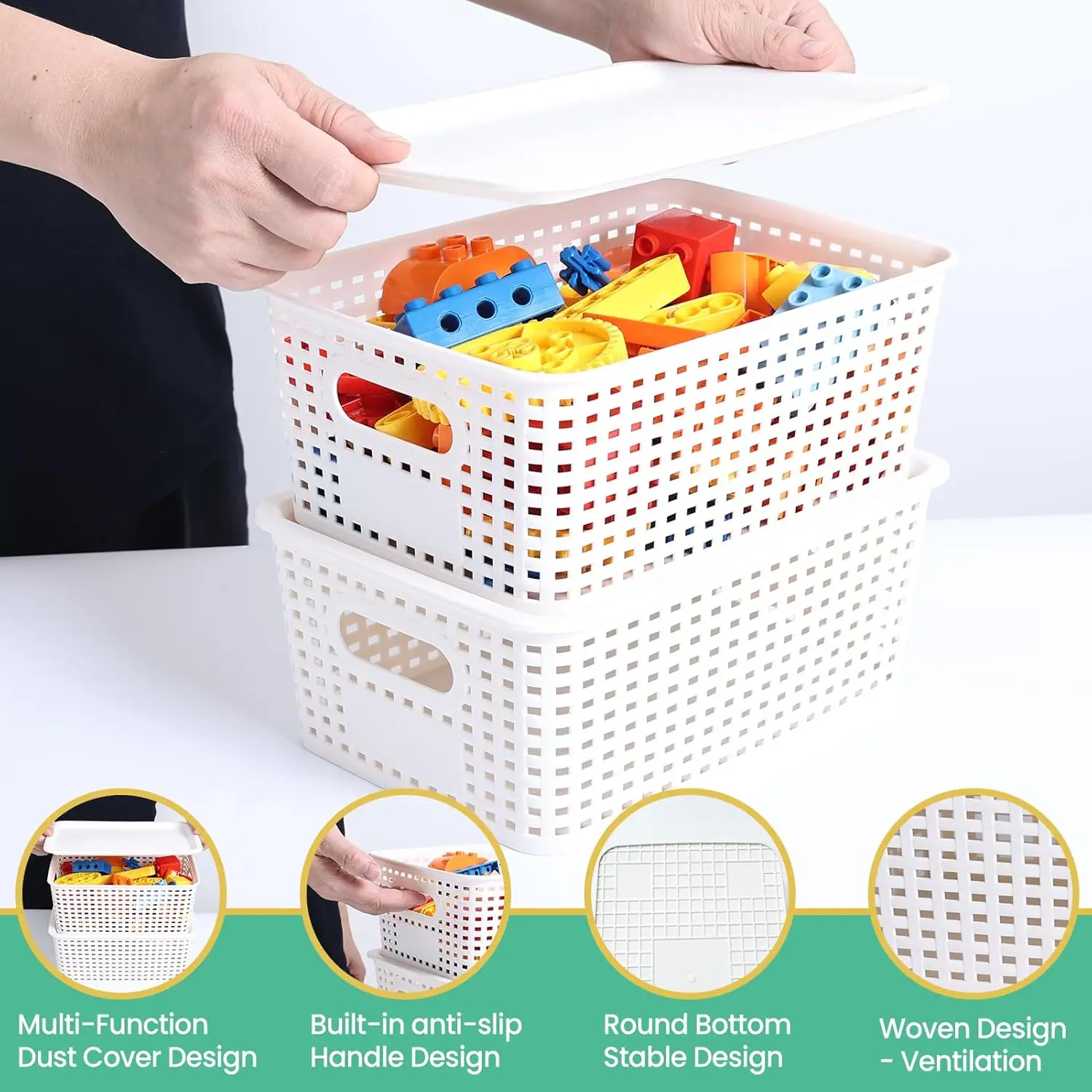
Matching Basket Dimensions to Specific Wardrobe Items
Different wardrobe items have unique storage requirements. Matching your basket dimensions to the specific items you plan to store ensures maximum efficiency and protection for your belongings.
Folded Clothing (T-shirts, Sweaters, Jeans)
- Ideal height: 4-8 inches (10-20 cm)
- Width/depth considerations:
- T-shirts typically need at least 10 × 12 inches (25 × 30 cm) of surface area
- Sweaters require deeper baskets, around 12-14 inches (30-35 cm)
- Jeans fold best in baskets at least 12 inches (30 cm) wide
- Capacity guidelines: A 12 × 12 × 6 inch basket comfortably holds 5-8 folded t-shirts
Small Accessories (Socks, Underwear, Scarves)
- Ideal height: 3-6 inches (7.5-15 cm)
- Width/depth considerations:
- Shallow baskets (3-4 inches high) allow easy visibility
- Compartmentalized baskets prevent small items from becoming jumbled
- Width of 8-10 inches (20-25 cm) provides good accessibility
- Capacity guidelines: A 10 × 10 × 4 inch basket typically holds 10-15 pairs of socks
Bulky Items (Winter Wear, Blankets)
- Ideal height: 8-12 inches (20-30 cm)
- Width/depth considerations:
- Deeper baskets (14+ inches/35+ cm) accommodate bulkier folds
- Wider baskets reduce the need for excessive folding
- Reinforced sides prevent bulging
- Capacity guidelines: A 14 × 16 × 10 inch basket can hold 2-3 folded sweaters or 1 small blanket
Shoes and Handbags
- Ideal height: 6-10 inches (15-25 cm) for most shoes, 10-14 inches (25-35 cm) for boots
- Width/depth considerations:
- Allow at least 9 inches (23 cm) width per shoe pair
- Structured baskets protect shape and prevent crushing
- Divided baskets keep pairs together
- Capacity guidelines: A 14 × 14 × 8 inch basket typically holds 2-3 pairs of shoes
Our collection of woven storage baskets offers various sizes perfectly suited for each of these wardrobe item categories, ensuring you can create a comprehensive organization system.
Selecting the Optimal Basket Materials for Different Wardrobe Contents
The material of your storage baskets affects not just how they look, but how they function and protect your belongings. Each material offers distinct advantages for different wardrobe items.
Fabric Baskets (Canvas, Linen, Felt)
Benefits:
* Gentle on delicate fabrics and accessories
* Flexible shape adapts to odd spaces
* Typically lightweight and easy to move
* Wide range of colors and patterns available
Drawbacks:
* May collect dust more readily
* Less structured, can sag when filled
* May absorb moisture or odors
* Can be harder to clean thoroughly
Best for: Lightweight clothing, accessories, scarves, lingerie
Woven Natural Materials (Wicker, Rattan, Seagrass)
Benefits:
* Natural ventilation prevents mustiness
* Durable and long-lasting construction
* Aesthetically appealing natural textures
* Often handcrafted with unique character
Drawbacks:
* Rough surfaces might snag delicate fabrics
* Can be more difficult to clean thoroughly
* May shed small fibers initially
Best for: Folded everyday clothing, towels, bedding, sturdy accessories
Plastic and Acrylic Options
Benefits:
* Complete visibility of contents
* Waterproof and easy to wipe clean
* Lightweight and durable
* Won’t absorb odors or stains
Drawbacks:
* Less aesthetically pleasing
* Can yellow over time
* May crack under weight or pressure
Best for: Seasonal items, shoes, items needing moisture protection
Wire and Metal Designs
Benefits:
* Maximum ventilation
* Extremely durable construction
* Modern, industrial aesthetic
* Typically hold shape well under weight
Drawbacks:
* Small items can fall through openings
* May scratch delicate surfaces
* Can rust if not properly coated
Best for: Shoes, handbags, folded jeans and heavier items
Finding the right material balance often involves mixing different basket types within your wardrobe. The techniques used for effortless laundry organization with wicker baskets translate well to wardrobe storage, helping you maintain order with minimal effort.
Advanced Strategies for Maximizing Vertical and Horizontal Shelf Space
Once you have the right basket sizes, strategic placement and arrangement can dramatically increase your wardrobe’s storage capacity.
Vertical Space Maximization Techniques
- Stackable basket systems
- Choose baskets designed to stack securely without tipping
- Use lower baskets for heavier items, lighter items on top
Consider leaving one side unstacked for easier access to lower basket contents
Under-shelf hanging options
- Install slide-under baskets that utilize otherwise wasted space
- Perfect for small accessories, scarves, or rolled items
Ensure 1-2 inches clearance below for smooth operation
Shelf dividers with baskets
- Install vertical dividers to create customized basket zones
- Prevents baskets from shifting while maximizing vertical use
- Creates distinct sections for different storage needs
Horizontal Space Optimization
- Back-to-front dual basket arrangements
- For deep shelves (16+ inches), place smaller baskets in front, larger in back
- Front baskets for frequently accessed items, back for seasonal storage
Ensures no items get lost in the deep recesses of shelves
Side-by-side arrangements
- Place complementary item categories adjacent to each other
- Use basket width to create visual boundaries between categories
Mix rectangular and square baskets for optimal fit
Pull-out basket systems
- Install sliding tracks for basket pull-out capability
- Enables full access to deep shelf contents
- Works especially well for corner shelves or hard-to-reach areas
Strategic Basket Placement Principles
- Frequency-based placement
- Daily-use items in most accessible locations (eye level, front positions)
- Seasonal or occasional items stored higher or deeper
Reserve prime shelf real estate for most-needed items
Seasonal rotation systems
- Designate specific basket zones for current-season items
- Create a scheduled system for rotating seasonal storage
Use larger baskets for off-season storage in less accessible areas
Visual weight distribution
- Balance heavier-looking baskets across the wardrobe
- Maintain consistent basket heights within each shelf when possible
- Create a visual rhythm with alternating basket sizes or materials
Our collection of square wicker baskets offers perfect options for these advanced organization techniques, enabling you to create systems tailored exactly to your wardrobe configuration.
Black Wicker Baskets, Rattan Storage Baskets, Tall Wicker Baskets, Wicker Shelf Baskets, Woven Storage Baskets
5-Tier Distressed Black Wood Frame Storage Tower with Removable Wicker Baskets for Home Organization$715.80 Select options This product has multiple variants. The options may be chosen on the product pageWicker Laundry Baskets, Woven Laundry Baskets, Woven Storage Baskets
$392.02 Select options This product has multiple variants. The options may be chosen on the product pageRattan Shelf Baskets, Rattan Storage Baskets, Small Wicker Baskets, Square Wicker Baskets
Square Plastic Wicker Storage Baskets Set of 3 with Collapsible Design for Cube Storage Organization$185.47 Select options This product has multiple variants. The options may be chosen on the product pageWicker Baskets with Handles, Wicker Storage Baskets, Woven Storage Baskets
$137.92 Select options This product has multiple variants. The options may be chosen on the product pageLarge Wicker Laundry Baskets, Tall Wicker Baskets, Woven Laundry Hampers, Woven Storage Baskets
$130.54 Select options This product has multiple variants. The options may be chosen on the product pageRattan Shelf Baskets, Rattan Storage Baskets
$345.47 Select options This product has multiple variants. The options may be chosen on the product page
Common Basket Selection Mistakes and How to Avoid Them
Even with careful planning, certain basket selection errors frequently derail wardrobe organization efforts. Being aware of these common mistakes can save you time, money, and frustration.
Buying without measuring
* The problem: Baskets that don’t fit your shelves waste money and create disorganization
* The solution: Always measure shelves before purchasing and bring measurements when shopping
Choosing baskets that are too deep
* The problem: Items get buried and forgotten at the bottom
* The solution: Follow the depth clearance rule and consider how deep you can comfortably reach
Selecting baskets too tall for contents
* The problem: Wasted vertical space and difficulty accessing items at the bottom
* The solution: Match basket height to the specific item type (shorter for small items, taller for bulky ones)
Ignoring weight considerations
* The problem: Overloaded shelves can sag or break
* The solution: Consider both basket weight and intended contents; reinforce shelves if needed
Material mismatches with contents
* The problem: Delicate items damaged by rough baskets, or small items falling through openings
* The solution: Align basket material with item requirements (soft fabric for delicates, closed weave for small items)
Overlooking internal wardrobe features
* The problem: Baskets that interfere with doors, hinges, or supports
* The solution: Account for all internal features when measuring and selecting baskets
For more comprehensive guidance on selecting the right storage solutions, our guide to best wicker baskets for laundry organization offers valuable insights that apply equally well to wardrobe organization.
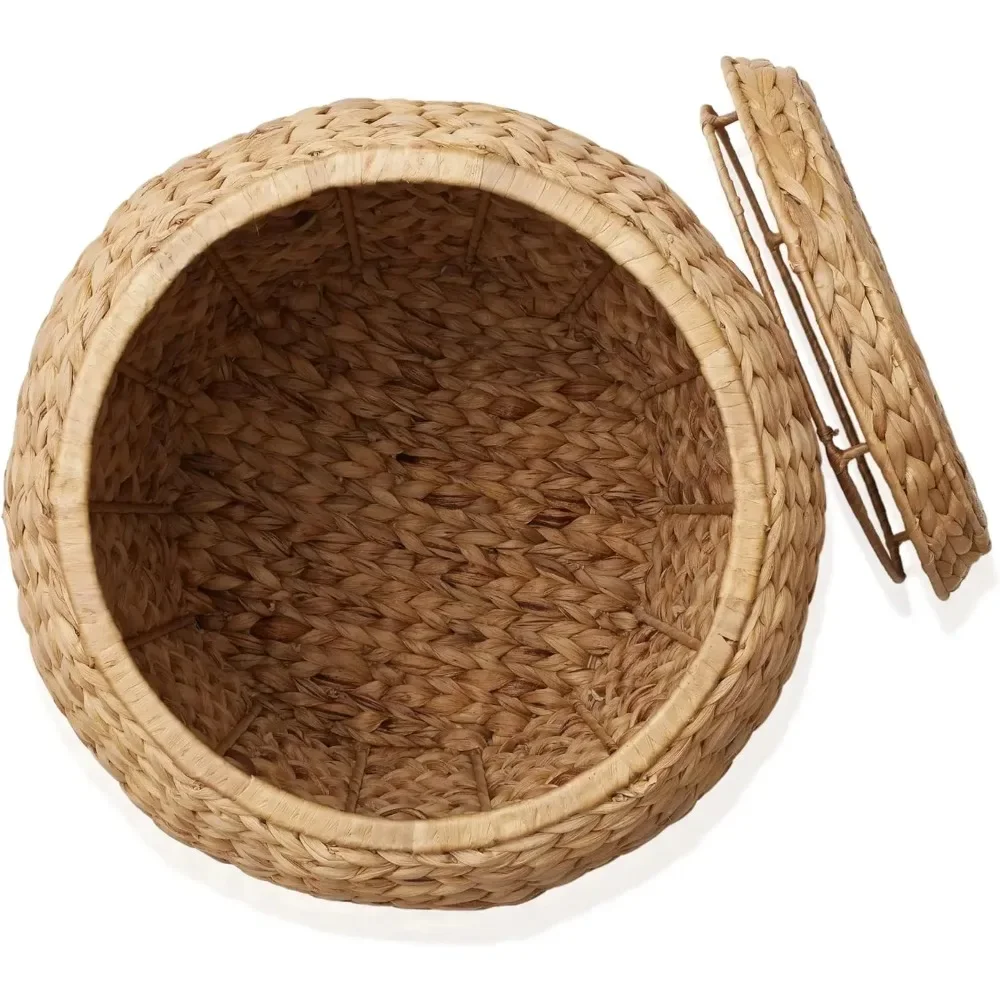
Innovative Basket Solutions: Emerging Trends in Wardrobe Organization
The world of wardrobe organization is constantly evolving with innovative solutions that combine functionality and style. Staying aware of these trends can help you make forward-thinking choices for your storage needs.
Sustainable and eco-friendly materials are rapidly gaining popularity as consumers seek environmentally responsible options. Look for baskets made from responsibly harvested natural fibers, recycled materials, or biodegradable alternatives to plastic.
Modular systems offer unprecedented flexibility, with baskets designed to interconnect, stack, or reconfigure as your storage needs change. These systems allow you to start small and expand gradually, adapting to different wardrobe layouts over time.
Space-saving designs specifically engineered for compact wardrobes feature collapsible sides, nestable constructions, and multi-functional compartments that maximize every inch of available space.
Customizable options now include baskets with adjustable dividers, removable liners, and interchangeable parts that adapt to different item types and sizes without requiring entirely new baskets.
The aesthetic trend is moving toward minimalist designs with clean lines, subtle textures, and neutral colors that create visual calm. This approach helps your wardrobe feel like a curated, intentional space rather than just storage.
To future-proof your basket selections, choose high-quality, timeless designs that work with various decor styles and prioritize versatile options that can serve multiple purposes as your needs evolve. Our collection of premium storage baskets for wardrobes showcases these innovative trends while maintaining the quality craftsmanship Tidy Treasure is known for.
Best Practices for Long-Term Basket Organization Maintenance
Even the most perfectly organized wardrobe needs regular maintenance to stay functional. Implementing these best practices will help your basket organization system remain effective over time.
Establish a regular review schedule:
* Monthly quick-tidy to realign baskets and regroup items
* Seasonal deep organization to rotate clothes and assess system functionality
* Annual evaluation of whether basket sizes and arrangements still meet your needs
Maintain your baskets properly:
* Wicker/rattan: Dust regularly, occasional gentle brushing, avoid excessive moisture
* Fabric: Vacuum surfaces monthly, spot clean as needed, full washing per manufacturer instructions
* Plastic/acrylic: Wipe with mild soap solution quarterly, avoid abrasive cleaners
* Wire/metal: Check for rust or sharp edges, wipe clean with damp cloth
Adapt for seasonal changes:
* Rotate seasonal clothing to different basket zones
* Adjust basket heights if needed for bulkier winter items
* Consider storing off-season items in larger baskets in less accessible areas
Prevent basket damage:
* Avoid overloading beyond weight capacity
* Rotate baskets periodically to prevent uneven wear
* Store heavy items in lower baskets to maintain shelf integrity
* Keep baskets away from direct sunlight to prevent fading
When organization falls apart:
* Empty the affected basket completely
* Sort items into keep/relocate/donate piles
* Reload basket with only appropriate items
* Consider if the basket size or type needs to be reconsidered
If you notice that items consistently don’t fit, or baskets are always overflowing, it’s a sign that your storage needs have changed and your basket sizing should be reassessed.
Can You Use Under-Bed Storage Baskets in Wardrobes?
Under-bed storage baskets can indeed be repurposed for wardrobe use, but they require careful consideration to ensure they work effectively in this different context.
The primary advantage of under-bed baskets—their shallow height and large footprint—can actually be beneficial in certain wardrobe situations. They work particularly well on deep shelves where traditional deeper baskets would make items at the back difficult to access.
To successfully adapt under-bed baskets for wardrobe use:
* Ensure the height fits your shelf clearance (typically 4-6 inches for under-bed baskets)
* Check that the depth doesn’t exceed your shelf depth by more than 1-2 inches
* Consider adding dividers if the wide format makes organization challenging
* Look for options with sturdy handles for easier sliding and removal
Under-bed baskets work best in wardrobes for:
* Storing flat items like scarves, ties, or belts
* Creating single-layer storage for t-shirts or lightweight sweaters
* Organizing accessories across categories with natural divides
* Maximizing shelf space with very limited height clearance
If your wardrobe has higher clearance but you like the shallow concept, our selection of tall baskets for organizing offers alternatives with similar accessibility benefits but more appropriate dimensions for standard wardrobe shelving.
Is It Better to Choose Clear or Opaque Baskets for Wardrobe Storage?
The choice between clear and opaque baskets comes down to both practical and aesthetic considerations for your unique wardrobe needs.
Clear baskets offer immediate visibility of contents, eliminating the need to pull out multiple baskets when searching for specific items. This visibility can significantly streamline your daily routine and reduce the frustration of forgetting what’s stored where. However, clear options are typically limited to plastic or acrylic materials, which may not match everyone’s aesthetic preferences and can sometimes look cluttered if contents aren’t neatly arranged.
Opaque baskets provide a visually uniform appearance regardless of what’s stored inside, creating a cleaner, more cohesive look in your wardrobe. They conceal visual clutter and protect contents from dust and light exposure, which can be beneficial for preserving delicate fabrics. The downside is the need to label baskets or remember their contents, potentially leading to more time spent searching.
Your decision should consider:
Item access frequency – Clear baskets work well for frequently accessed items, while opaque options are better for occasional-use items
Visual preferences – If seeing all contents creates a sense of visual clutter that bothers you, opaque baskets create a calmer aesthetic
Material preferences – If you prefer natural materials like wicker or fabric, opaque baskets offer more options
Wardrobe lighting – In darker wardrobes, clear baskets can make finding items easier without additional lighting
A hybrid approach often works best, with clear baskets for everyday essentials and opaque options for seasonal or less frequently used items.
Frequently Asked Questions About Wardrobe Basket Sizing
How do I choose baskets for oddly-shaped shelves?
For non-rectangular shelves, measure the narrowest points in both width and depth to determine your maximum basket dimensions. Consider custom-sized baskets or combining multiple smaller baskets in creative arrangements to maximize the unusual space. Corner shelves often work well with wedge-shaped baskets or square baskets placed at angles.
What’s the maximum weight a basket shelf can typically support?
Standard wardrobe shelving typically supports 30-50 pounds per linear foot, but this varies significantly based on shelf material, thickness, and support structure. Particle board shelves may support only 15-25 pounds per linear foot, while solid wood or reinforced shelves might handle 75-100 pounds. When in doubt, distribute weight by using multiple smaller baskets rather than one large, heavily loaded basket.
Should laundry baskets be stored in the wardrobe?
While possible, storing full-sized laundry baskets in wardrobes isn’t usually efficient due to their large dimensions. Better alternatives include smaller hampers designed specifically for wardrobe use or collapsible laundry bags that can be stored flat when not in use. If space permits, designate a lower shelf or floor section for a slim profile hamper.
How do I organize baskets for a shared wardrobe?
For shared wardrobes, clearly define zones for each person, either vertically (different shelves) or horizontally (left/right divisions). Use distinct basket styles, colors, or labels to visually separate belongings. Consider individual preferences—one person might prefer clear baskets for visibility while another values the uniformity of opaque options. Establish common areas for shared items like linens or seasonal accessories.

